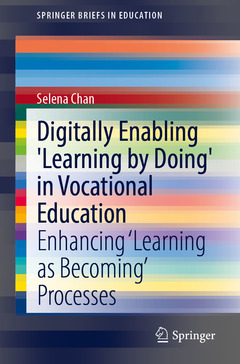Description
Digitally Enabling 'Learning by Doing' in Vocational Education, 1st ed. 2021
Enhancing ‘Learning as Becoming’ Processes
SpringerBriefs in Education Series
Author: Chan Selena
Language: English
Keywords
apprentice learning; practice-based learning; technology-enhanced learning; distance learning; digital literacy; multimodality in education; multiliteracies in education; e-assessments in education; e-assessments for learning; learning analytics; feedback for learning; apprenticeship in New Zealand; workplace learning in New Zealand; occupational identity in New Zealand; vocational education in New Zealand
Support: Print on demand
Description
/li>Contents
/li>Biography
/li>Comment
/li>




